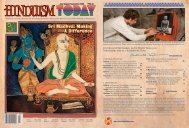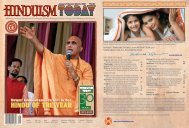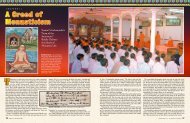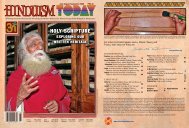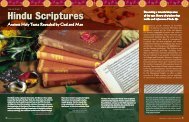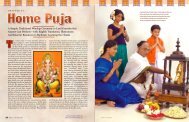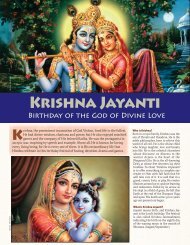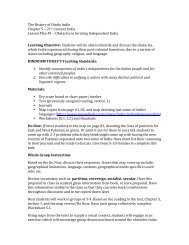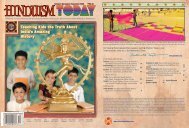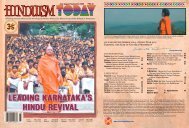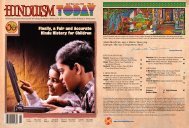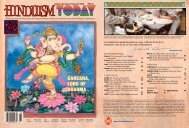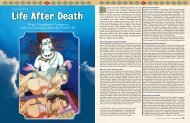Now I was in a desperate hurry to get a good knowledge of <strong>the</strong>doctrine of socialism. A desire to read Karl Marx now became irresistible.First, I read <strong>the</strong> Communist Manifesto. It was simplybreathtaking in <strong>the</strong> breadth and depth of its sweep over vast vistasof human history. It was also a great call to action, to change <strong>the</strong>world and end exploitation and social injustice for all time to come.At <strong>the</strong> same time I concluded that God as a creator of this worldcould be conceived only in three ways—ei<strong>the</strong>r as a rogue who sanctionedand shared in <strong>the</strong> roguery prevalent in his world, or as an imbecilewho could no more control what he had created, or as a sannyasin,who no more cared for what was happening to his creatures. IfGod was a rogue, we had to rise in revolt against his rule. If he was animbecile, we could forget him and take charge of <strong>the</strong> world ourselves.And if he was a sannyasin, he could mind his business while we mindedour own. The scriptures, however, held out a different version ofGod and his role, one that was supported nei<strong>the</strong>r by experience norby logic. The scriptures should, <strong>the</strong>refore, be burned in a bonfire,preferably during winter when <strong>the</strong>y could provide some warmth.Four years after leaving college, I was ready to join <strong>the</strong> Com munistParty of India. I conveyed my decision to my friend Ram Swarup,whom I had met after leaving college and who was to exercise adecisive influence on my intellectual evolution. He wrote back immediately:“You are too intelligent not to become a communist. Butyou are also too intelligent to remain one for long.”This was a prophecy which came true. It was only a year and a fewmonths later that I renounced Marxism as an inadequate philosophy,realized that <strong>the</strong> Communist Party of India was a fifth column for<strong>the</strong> advancement of Russian Imperialism in India, and denounced<strong>the</strong> Soviet Union under Stalin as a vast slave empire.The promise made by Sri Aurobindo, on <strong>the</strong> o<strong>the</strong>r hand, regarding<strong>the</strong> ultimate destiny of <strong>the</strong> human race was far more stupendousthan that held out by Marx. Howsoever vague and inchoate my visionmight have been at that time, I did feel that Sri Aurobindo was talkingabout fundamentally different dimensions of <strong>the</strong> universe andhuman life. The gulf between my mundane interests and <strong>the</strong> grandaspirations dictated by Sri Auro bindo’s vision was very wide, and Icould hardly muster <strong>the</strong> care or <strong>the</strong> courage to cross over. But in <strong>the</strong>inner recesses of my mind, I did become curious about <strong>the</strong> natureof <strong>the</strong> universe, man’s place in it and a meaningful goal of human life.I was present in <strong>the</strong> Second Party Conference of <strong>the</strong> CommunistParty of India which was held in <strong>the</strong> Maidan at Calcutta inFebruary, 1948. My friend Ram Swarup suddenly appeared on <strong>the</strong>scene and expressed his intention to stay with me for quite sometime. I was very happy because he was my nearest and dearestin <strong>the</strong> whole world. I did not know that he had by now come toregard communism as a great evil threatening to engulf <strong>the</strong> futureof mankind. After I failed to put my three best communist friendsagainst Ram Swarup, I had to face him myself and all alone. Thediscussions spread over several months. Most of <strong>the</strong> time I repeatedparty slogans, sometimes very vehemently. Ram Swarup dismissed<strong>the</strong>m with a smile.Finally, I was back to square one. My faith in Gandhism had lost<strong>the</strong> battle to Marxism. Now I was no longer a Marxist. I asked myselfagain and again: Where do I go from here?It was at this time that I fell seriously ill and lost a lot of weight.A Catholic missionary whom I had known earlier came to visit me.He was a good and kindly man and had a strong character. TheFa<strong>the</strong>r, as I called him, found me in a difficult condition, physicallyas well as financially. He felt sure that it was in such times that JesusChrist came to people. He asked me if I was prepared to receiveJesus. I did not understand immediately that he was inviting me toget converted to Catholicism. My impression was that he wanted tohelp me with some spiritual exercises prescribed by Christianity.Moreover, I had always admired Jesus. I had, <strong>the</strong>refore, no objectionto receiving him. Only I was doubtful if someone was really in aposition to arrange my meeting with Jesus. I became aware of <strong>the</strong>Fa<strong>the</strong>r’s true intentions as I traveled with him to a distant monastery.134 what is hinduism?s. rajamHe asked every o<strong>the</strong>r missionary he met on <strong>the</strong> way to pray for hissuccess.At this monastery, which was a vast place with very picturesquesurroundings, I was advised by <strong>the</strong> Fa<strong>the</strong>r to go into a retreat. Itmeant my solitary confinement to a room. I was not supposed tolook at or talk to anyone on my way to <strong>the</strong> bathrooms or while takingmy morning and evening strolls on <strong>the</strong> extensive lawns outside. AndI was to meditate on <strong>the</strong>mes which <strong>the</strong> Fa<strong>the</strong>r prescribed for mein <strong>the</strong> course of four or five lectures he delivered to me during <strong>the</strong>course of <strong>the</strong> day, starting at about 6:30 in those winter mornings. Iwas not used to this way of life. I had never lived in such solitude bymy own choice. My only solace was that I was allowed to smoke andprovided with plenty of books on <strong>the</strong> Christian creed and <strong>the</strong>ology.I tried to read some of <strong>the</strong> books, but I failed to finish any one of<strong>the</strong>m. They were full of Biblical <strong>the</strong>mes and <strong>the</strong>ological terminologywith which I was not familiar. Most of <strong>the</strong> time <strong>the</strong>y made me recallRam Swarup’s observation about mere cerebration. Or <strong>the</strong>y weresimplistic harangues to love Christ and join <strong>the</strong> Catholic Church.They had a close similarity to com mun ist pamphlets which I hadread in plenty. The Fa<strong>the</strong>r had asked me again and again to invokeChrist and meditate upon him. But he had not told me how to doit. I had no previous practice in meditation. I did not know how toinvoke Christ, or any o<strong>the</strong>r godhead for that matter.During a lecture about creation, <strong>the</strong> Fa<strong>the</strong>r said that God in Hiswisdom and kindness had made all fishes and animals and birdsfor man’s consumption. I immediately rose in revolt. I told him veryemphatically that I was a Vaishnava and a vegetarian and that Ihad absolutely no use for a God that bestowed upon man <strong>the</strong> rightto kill and eat His o<strong>the</strong>r creatures simply because man happenedto be stronger and more skilled. I added that in my opinion it was<strong>the</strong> duty of <strong>the</strong> strong and <strong>the</strong> more skilled to protect <strong>the</strong> weak and<strong>the</strong> less wily.The Fa<strong>the</strong>r also suddenly lost his self-possession. He almost shouted:“I can never understand you <strong>Hindu</strong>s who go about seeking asoul in every lice and bug and cockroach that crawls around you.The Bible says in so many words that man is God’s highest creation.What is wrong with <strong>the</strong> higher ruling over <strong>the</strong> lower?”On our way back to <strong>the</strong> big city where his mission was housed, hebecame his old normal self again. There was not a trace of bitternesson his face or in his voice as we talked and joked and discussedseveral serious and not so serious matters. Now I took my courage inboth my hands and asked him my final question: “Fa<strong>the</strong>r, am I notalready a Christian? I do not normally tell a lie. I do not steal. I donot bear false witness. I do not covet my neighbor’s wife or property.What more can a man do to demand God’s grace and kinship withChrist? Why should you insist on a formal conversion which in noway helps me to become better than what I am?” His reply was verypositive and it estranged me from <strong>the</strong> Christian creed for good. Hesaid: “It is an illusion that you can become a Christian if you practiceChristian virtues. One cannot claim to be virtuous unless onePassage: Entering <strong>Hindu</strong>ism often brings a change in culture, fromWestern materialism to Asian refinement, a process depicted at leftby a lady’s stepping through a magic portal, leaving her old worldand entering a new oneis baptized in <strong>the</strong> Church of Christ. He is <strong>the</strong> only savior. No oneoutside His fold can claim salvation. The only thing <strong>the</strong> hea<strong>the</strong>nscan look forward to is eternal hell-fire.”My new job in Delhi gave me a lot of leisure. But what matteredmost was that I could now spend all my evenings with Ram Swarup.He was now spending long hours sitting in meditation. His talksnow centered round <strong>the</strong> Vedas, <strong>the</strong> Upa nishads, <strong>the</strong> Gita, <strong>the</strong> Mahabharataand <strong>the</strong> Buddha. In <strong>the</strong> long evenings I spent with RamSwarup I compared with him my notes on <strong>the</strong> Mahabharata. ButRam Swarup’s way of looking at <strong>the</strong> Mahabharata was quite different.He related it directly to <strong>the</strong> Vedas. He expounded how <strong>the</strong>mighty characters of this great epic embodied and made living <strong>the</strong>spiritual vision of <strong>the</strong> Vedic seers. What fascinated me still morewas Ram Swarup’s exposition of dharma as enunciated in <strong>the</strong> Mahabharata.To me, dharma had always been a matter of normativemorals, external rules and regulations, do’s and dont’s, enforced onlife by an act of will. Now I was made to see dharma as a multidimensionalmovement of man’s inner law of being, his psychic evolution,his spir itual growth and his spontaneous building of an outerlife for himself and <strong>the</strong> community in which he lived.The next thing I did was to read and reread <strong>the</strong> major works ofAurobindo and discuss his message with Ram Swarup day after day.Aurobindo would have remained an abstract philosopher for me hadnot Ram Swarup explained to me how this seer was <strong>the</strong> greatestexponent of <strong>the</strong> Vedic vision in our times. Aurobindo’s message, hetold me, was in essence <strong>the</strong> same old Vedic message, namely, thatwe are Gods in our innermost being and should live <strong>the</strong> life of Godson this Earth. He made me see what Aurobindo meant by <strong>the</strong> physical,<strong>the</strong> vital, <strong>the</strong> mental and <strong>the</strong> psychic. He related <strong>the</strong>se terms to<strong>the</strong> <strong>the</strong>ory of <strong>the</strong> five kosas in <strong>the</strong> Upanishads.I now requested Ram Swarup to initiate me into meditation. Hetold me that I could sit and meditate with him whenever I liked,wait and watch, go within myself as far as I could manage, at anytime, dwell on whatever good thoughts got revealed in <strong>the</strong> process,and <strong>the</strong> rest would follow. I acted upon his simple instructions withsome measure of skepticism in my mind. But in <strong>the</strong> next few days Icould see some results, which encouraged me.One day I meditated on ahimsa, which had remained an abstractconcept for me so far. After a while I found myself begging forgivenessfrom all those whom I had hurt by word or deed, or towardswhom I had harbored any ill will. It was not an exercise in generalities.Person after person rose into my memory, going back into <strong>the</strong>distant past and I bowed in repentance before each one of <strong>the</strong>m.Finally I begged forgiveness from Stalin, against whom I had writtenso much and upon whom I had hurled so many brickbats. Thebit terness which had poisoned my life over <strong>the</strong> long years was sweptoff my mind in a sudden relaxation of nerves. I felt as if a thousandthorns which had tormented my flesh had been taken out by a masterphysician without causing <strong>the</strong> slightest pain. I was in need of nogreater assurance that this was <strong>the</strong> way on which I should walk.One day I told Ram Swarup how I had never been able to accept<strong>the</strong> Devi, ei<strong>the</strong>r as Sarasvati or as Lakshmi or as Durga or as Kali.He smiled and asked me to meditate on <strong>the</strong> Devi that day. I triedmy best in my own way. Nothing happened for some time. Nothingcame my way. My mind was a big blank. But in <strong>the</strong> next moment <strong>the</strong>void was filled with a sense of some great presence. I did not see anyconcrete image. No words were whispered in my ears. Yet <strong>the</strong> rigidityof a lifetime broke down and disappeared. The Great Mo<strong>the</strong>r wasbeckoning her lost child to go and sit in her lap and feel safe fromall fears. We had a record of Dr. Go vind Gopal Mukho padhyaya’ssonorous stuti to <strong>the</strong> Devi. As I played it, I prayed to Her.My progress was not fast; nor did I go far. But I now felt sure thatchapter 13: how to become a hindu 135
From <strong>the</strong> Masonic Order and Roman CatholicismShyamadeva and Peshanidevi Dandapani, both age 60, live in Anchorage,Alaska. Shyamadeva is a commercial real estate brokerspecializing in site acquisitions and leasing for local, regional andnational real estate clients. Peshanidevi is a retired nurse, “domesticengineer” and homemaker.We pilgrimaged to Kauai in November of 1994 forKrittika Dipam. During this pilgrimage, we trulybegan to embrace <strong>the</strong> Sanatana Dharma and returnedhome to Alaska to talk to our family andfriends about becoming <strong>Hindu</strong>s, and to beginmerging with <strong>the</strong> <strong>Hindu</strong> community in Anchorage.For <strong>the</strong> most part, everyone was tolerant of our enthusiasmabout becoming <strong>Hindu</strong>s.We had already leased out our house in preparation for moving toKauai, so we rented an apartment, continued our studies and began<strong>the</strong> conversion and severance process. It was our in-depth study toreview our lives, to determine our true beliefs, where <strong>the</strong>y camefrom and if <strong>the</strong>y were still valid for us. There were many rewritesand surprises. We returned to our previous influences (myself to<strong>the</strong> Freemasons and Peshani devi to <strong>the</strong> Catholic Church), studyingand participating with <strong>the</strong>m again to be positive that we wantedto change our path. I returned to <strong>the</strong> Masonic Lodge and fully embracedFreemasonry for <strong>the</strong> next thirty days. I attended <strong>the</strong> lodgeand participated fully in all its ceremonies and rituals. At <strong>the</strong> end of<strong>the</strong> thirty days, I was completely convinced that I no longer held <strong>the</strong>inherent beliefs of <strong>the</strong> Masonic Order. Even with all <strong>the</strong> years of beinga very active Mason I knew it was nei<strong>the</strong>r my belief nor my path.The Masons say, “Once a Mason, always a Mason.” The only way tosever <strong>the</strong> vows was to become a self-imposed apostate. I prepareda letter declaring that I was a self-imposed apostate to <strong>the</strong> Masonicvows and beliefs, and that I was converting fully to <strong>Hindu</strong>ism. I read<strong>the</strong> letter in open lodge before all <strong>the</strong> members present and a copywas given to <strong>the</strong> secretary to be recorded into <strong>the</strong> minutes of <strong>the</strong>meeting on June 8, 1995, at Kenai Lodge No. 11.Peshanidevi returned to <strong>the</strong> Midwest to attend mass and meetwith <strong>the</strong> priest who had given her instructions for being baptized aCatholic. Two hours of discussion did not produce a letter of release,because, he said, “Once a Catholic, always a Catholic.” He took itvery personally but promised a letter to follow. A month later it arrived(above left). The fire was strong but <strong>the</strong> bond was broken.We applied for our legal name change and announced it in <strong>the</strong>newspapers. On <strong>the</strong> auspicious day of July 9, 1995, in Kadavul Hinthiswas <strong>the</strong> method by which I could rediscover for myself <strong>the</strong> greattruths of which <strong>the</strong> ancients had spoken in <strong>Hindu</strong> scriptures. It wasnot <strong>the</strong> end of my seeking, which had only started in right earnest.But it was surely <strong>the</strong> end of my wandering in search of a shorewhere I could safely anchor my soul and take stock of my situation.The soul’s hunger for absolute Truth, absolute Good, absoluteBeauty and absolute Power, I was told, was like <strong>the</strong> body’s hungerfor wholesome food and drink. And that which satisfied this hungerof <strong>the</strong> human soul, fully and finally, wasSanatana Dharma, true for all times andclimes. A votary of Sanatana Dharma didnot need an arbitrary exercise of will toput blind faith in a supernatural revelationlaid down in a single scripture. Hedid not need <strong>the</strong> inter mediacy of a historicalprophet nor <strong>the</strong> help of an organizedchurch to attain salvation. SanatanaDharma called upon its votary to explorehis own self in <strong>the</strong> first instance and seefor himself <strong>the</strong> truths expounded in sacredscriptures. Prophets and churchesand scriptures could be aids, but never<strong>the</strong> substitutes for self-exploration, selfpurificationand self-transcendence.I had come back at last, come backto my spiritual home from which I hadwandered away in self-forgetfulness. Butthis coming back was no atavistic act. On<strong>the</strong> contrary, it was a reawakening to myancestral heritage, which was waitingfor me all along to lay my claim on itslargesses. It was also <strong>the</strong> heritage of allmankind, as proved by <strong>the</strong> seers, sagesand mystics of many a time and clime. Itspoke in different languages to differentpeople. To me it spoke in <strong>the</strong> language of<strong>Hindu</strong> spirituality and <strong>Hindu</strong> culture at<strong>the</strong>ir highest. I could not resist its call. Ibecame a <strong>Hindu</strong>.My Whole Family Became <strong>Hindu</strong>sIsani Alahan, 52, (photo at right) lived inChennai, India, for several years, whereshe worked in <strong>the</strong> home, cooking SouthIndian ayurvedic meals for her family of five, and did home-schoolingwith her youngest daughter. She also studied Carnatic music,Sanskrit, hatha yoga and <strong>the</strong> Kerala health system known as Kalaripayattu.She returned with her family to live in Kauai in June,2000.I was introduced to <strong>Hindu</strong>ism in 1970 through a local hatha yogaclass in Carson City, Nevada. As time went on, I read more aboutyoga and <strong>the</strong> wonderful benefits for <strong>the</strong> body and mind. At this timeI decided to become a vege tar ian. I was sixteen years old. In 1972my interest in meditation manifested. I attended weekly satsanga inVirginia City, Nevada. During <strong>the</strong> first satsanga, I had a memorablevision of Lord Siva Nataraja on <strong>the</strong> banks of <strong>the</strong> sacred Ganga. Mylife had changed.In 1975 I married my husband of 25 years. My husband was acceptingof my beliefs, but wasn’t interested in studying. I continuedon my own, and in 1980 I legally changed my name to Isani Alahanfrom Ardith Jean Barton, but kept my husband’s last name, Pontius.In December of 1982 I completed my conversion to <strong>Hindu</strong>ism. Iprepared a statement of apostasy and took it to <strong>the</strong> local priest. Helooked at it and agreed to sign my formal release from <strong>the</strong> CatholicChurch. As I took a deep sigh of relief, he hesitated and asked meto leave <strong>the</strong> room. When I returned, he had changed his mind. Hetold me he had called <strong>the</strong> Bishop in Reno and was told he could not136 what is hinduism?ananda vikadanAcceptance and release: (above) Isani Alahan’sfamily was featured on <strong>the</strong> cover of a Tamilmagazine during <strong>the</strong>ir stay in Chennai, SouthIndia. Clockwise: husband Durvasa, Isani, Priya,Neesha and Sitara. (right) The letter of release forPeshanidevi Dandapani reveals <strong>the</strong> angst manypastors feel when confronted with conversion outof <strong>the</strong>ir church.sign <strong>the</strong> paper. Later I learned this was not true, and <strong>the</strong> Bishophad been out of town. I tried ano<strong>the</strong>r priest in <strong>the</strong> town where Iwas born. He was understanding, but also declined. Within a fewweeks, I called <strong>the</strong> Bishop to make an appointment to meet withhim. He told me to go back to <strong>the</strong> original priest, who would signmy declaration of apostasy. I returned to <strong>the</strong> local rectory and met apriest of Chinese descent. He was very warm and accommodating.He explained how he understood <strong>the</strong> <strong>Hindu</strong> concept of ethical conversion.He signed my declaration andwished me <strong>the</strong> best.I had my namakarana samskara atKauai’s <strong>Hindu</strong> Temple on December25, 1982, with my two-year-old daughter,Neesha. Then we were off for sixweeks of pilgrimage, visiting templesand ashrams throughout Ma lay sia, SriLanka and Tamil Nadu, India. It wasa fantastic spiritual experience thatcontinues to reverberate in my mind.At <strong>the</strong> time, my husband was not a<strong>Hindu</strong>, but our three daughters weregiven <strong>Hindu</strong> first names at birth, whilekeeping his family name. We raised <strong>the</strong>children according to <strong>Hindu</strong> Dharmaand our guru’s guidance. In 1984 wemoved to <strong>the</strong> Seattle area. During <strong>the</strong>ten years we lived in Seattle, my childrenand I ga<strong>the</strong>red with <strong>the</strong> o<strong>the</strong>r local<strong>Hindu</strong>s for weekly satsanga. We alsomet with <strong>the</strong> local <strong>Hindu</strong> community forfestivals. We studied Bharata Natyamand Carnatic vocal music. My childrenattended <strong>Hindu</strong> summer camps in Hawaii.All through <strong>the</strong>se years, with hispermission, I prayed that my husbandwould become a <strong>Hindu</strong>. Then, in 1993my husband formally adopted <strong>Hindu</strong>ism,legally changed his name from VictorDean Pontius to Durvasa Alahan. Hebecame a vegetarian, stopped smokingand gave up catch-and-release fishing,which was his favorite hobby. He had hisnamakarana samskara in 1994.In November, 1996, my husband and eldest daughter went on pilgrimageto India for a month. My daughter was interested in studyingBharata Natyam, and my husband left my daughter in Indiaso that she could attend Kalakshetra College of Fine Arts and geta diploma in Bharata Natyam. She started college in June of 1997,and <strong>the</strong> rest of <strong>the</strong> family, my husband, myself and two youngerdaughters, moved to Chennai, Tamil Nadu, in November of 1997.The past three years have had <strong>the</strong>ir moments of difficulty, but overall<strong>the</strong>y have been a peak experience of my life, a fulfillment of myheart’s desires.My Husband and I and Our Lifelong QuestAmala Seyon, 58, entered <strong>Hindu</strong>ism in May, 1975. A homemakeron Kauai, she and her husband live within walking distance of <strong>the</strong>Kadavul <strong>Hindu</strong> Temple.My first introduction to <strong>Hindu</strong>ism was when I metmy husband. He had been going through a verysoul-searching time, asking God why <strong>the</strong> Vietnamwar, why <strong>the</strong> rioting in <strong>the</strong> streets of America, andwhat does materialism have to offer <strong>the</strong> soul?While going through this trying time and praying,a born <strong>Hindu</strong> man came to his world religion classand talked about <strong>the</strong> <strong>Hindu</strong> religion. All <strong>the</strong> con-courtesy peshanidevi dandapanicepts of <strong>Hindu</strong>ism were <strong>the</strong> truths my husband was looking for. This<strong>Hindu</strong> man had a meditation center and invited anyone in <strong>the</strong> classto come. My husband started going on a regular basis.During this time, my husband asked me to marry him. He explainedto me about <strong>the</strong> <strong>Hindu</strong> religion and took me to <strong>the</strong> meditationcenter. I was so happy to hear some of <strong>the</strong> concepts, like Godis within you, <strong>the</strong> law of karma, <strong>the</strong> evolution of <strong>the</strong> soul. I felt like Ihad been in a cage, like a bird, and someone opened <strong>the</strong> door, and Iwas able to fly into something much bigger and deeper.My husband told me that if we got married this was <strong>the</strong> path hewanted us to take. I accepted that and supported it fully. This started<strong>the</strong> process of a confrontation of Western and Eastern philosophies.Our first encounter was in finding someone to marry us. Myhusband went to <strong>the</strong> <strong>Hindu</strong> meditation center and asked this saintlyman if he could marry us. His visa did not allow him to perform <strong>the</strong>ceremony. So we went to my family’s Christian minister and askedhim to marry us. He asked my husband a series of questions. Doyou believe Jesus Christ is <strong>the</strong> only Son of God? Do you believe that<strong>the</strong> Holy Bible is <strong>the</strong> only word of God? The questioning went on forsome time, and at <strong>the</strong> end of <strong>the</strong> interview he told my husband thatnot only could he not marry us but he was going to call my parentsand tell <strong>the</strong>m that he was against having me marry someone whowas not a Christian.We <strong>the</strong>n had to confront my mo<strong>the</strong>r, who was very much a Christian.This was all emotionally hard for her because of <strong>the</strong> beliefthat you could only be saved through <strong>the</strong> belief in Jesus Christ. Shewas very disappointed, and <strong>the</strong> issue caused a major disruption inour family. Finally, <strong>the</strong>y accepted our marriage, and my husbandlocated his past minister, who agreed to marry us.After our marriage, we started reading all we could on <strong>Hindu</strong>ism.My husband mistakenly followed <strong>the</strong> statements in <strong>Hindu</strong> scripturethat we now realize were intended for monks. We sold and gaveaway all our wedding gifts and went to live in very remote areas ofBritish Columbia. He read from morning until night and sat by ariver for hours on end, but we finally realized we were not makingreal spiritual progress, and I was lonely living in remote areas andeven on a deserted island.We started searching and praying, and one day someone invitedus to meet our Gurudeva, Sivaya Subramuniya swami. We recognizedwhat a great soul he was immediately, and we started ourstudies with him. When our two daughters were five and threeyears old, we all had our name-giving toge<strong>the</strong>r, formally entering<strong>the</strong> <strong>Hindu</strong> religion.My children were raised in <strong>the</strong> <strong>Hindu</strong> religion, and we spent alot of years living near <strong>the</strong> Flushing, New York, Ganesha Temple,learning <strong>the</strong> culture and mixing with born <strong>Hindu</strong>s. We learned somuch and felt so naturally a part of <strong>the</strong> <strong>Hindu</strong> heritage. We followeda curriculum for teaching our children in <strong>the</strong> home until <strong>the</strong>y weretwelve years old. Our daughters are now both married and are wonderfulmo<strong>the</strong>rs who stay home and care for <strong>the</strong>ir children. Our oldestdaughter is married to a wonderful <strong>Hindu</strong> man from Mauritiusin an extended family that showers her with love. We now live on<strong>the</strong> little island of Kauai and serve <strong>the</strong> community and <strong>the</strong> broader<strong>Hindu</strong> family through our many activities. We are so very grateful.chapter 13: how to become a hindu 137



